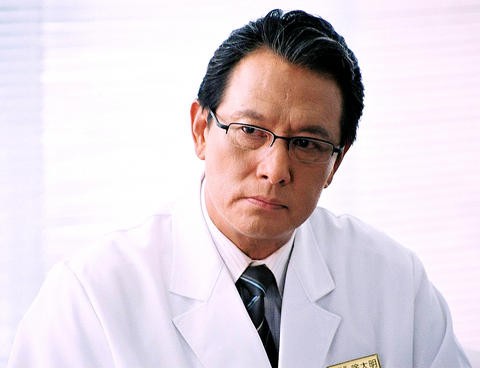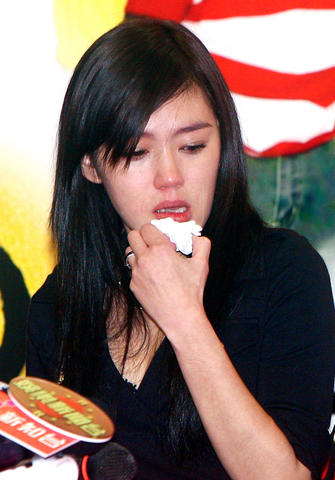The most embarrassing moment in the Golden Bell Awards' (金鐘獎) 42-year history came to light on Monday when the jury panel confessed that a top honor, the Best Supporting Actor accolade, was awarded to the wrong person at the ceremony on Saturday. The real winner was Hong Kong-based Chang Chia-nien (張嘉年), also known as Tai Pao (太保), not veteran actor Chang Kuo-chu (張國柱).
Jury committee convener Wang Chang-an (王長安) explained that the two nominees' similar-sounding names confused the awards ceremony presenter, which is the same as saying, "Oops, we handed the envelope to the wrong person."
What showbiz pundits are wondering is how badly the jury members squirmed on the night of the awards ceremony, which was televised live.

PHOTO: COURTESY OF CTV
An anonymous source, quoted in the Chinese-language press, claims jury members were called back for an emergency meeting during the ceremony. Official statements indicate the jury assembled on Sunday to formulate a damage-control policy and came up with a solution that was supposed to make everyone happy: the award goes to both Changs.
Gracefully accepting the trophy that didn't actually belong to him, Chang Kuo-chu couldn't help but voice his discontent by saying to the local press: "Rather than a celebration party, I'll just treat everyone to a bowl of Udon noodles [Udon is written as 烏龍 in Chinese, a term that means 'daft mistake']."
A third wave of police raids on celebrities suspected of using drugs officially began last week when newly crowned showbiz caner Suzanne Hsiao (蕭淑慎) was busted with 30.4g of cocaine, 2g of ketamine and drug paraphernalia sitting in her rented apartment. Shortly after Hsiao's arrest, starlet Pei Lin (裴琳) was brought to the police station and confessed to having been puffing the magic dragon for a couple of years.

PHOTO: TAIPEI TIMES
Prosecutors hinted that there are at least three more female stars and two basketball players on their to-bust list, which promises more grist for the media mill.
A new computer game (ent.163.com/special/000327LU/ziyibaolian.html) puts into action the ongoing speculation on the unspoken rivalry between Chinese stars Zhang Ziyi (章子怡) and Tang Wei (湯唯). The aim of the game is simple: Zhang has to kick Tang out of her way on the red carpet in order to give Ang Lee (李安) a hug.
The inspiration comes from Zhang's well-known complaint that Lee didn't give her a hug of encouragement during the shooting of Crouching Tiger, Hidden Dragon (臥虎藏龍) while Tang has been the center of Lee's countless praises.
In other film-related news, with John Woo's (吳宇森) epic period drama Red Cliff (赤壁) nearing the end of shootng this month, China Central Television last Saturday took the lead in examining the big-budget, Asian-financed film and revealed details of the movie's star-studded cast, which didn't score well with the Chinese Net-using public.
It is opined that Tony Leung (梁朝偉) looks too old to play the character Chou Yu (周瑜) and Takashi Kaneshiro (金城武) too sissy for Chu-ko Liang's (諸葛亮) part. Chang Chen (張震), however, stands out from the crowd for his insidious enough looks to bring Sun-chuan (孫權) to the big screen.

It’s a good thing that 2025 is over. Yes, I fully expect we will look back on the year with nostalgia, once we have experienced this year and 2027. Traditionally at New Years much discourse is devoted to discussing what happened the previous year. Let’s have a look at what didn’t happen. Many bad things did not happen. The People’s Republic of China (PRC) did not attack Taiwan. We didn’t have a massive, destructive earthquake or drought. We didn’t have a major human pandemic. No widespread unemployment or other destructive social events. Nothing serious was done about Taiwan’s swelling birth rate catastrophe.

Words of the Year are not just interesting, they are telling. They are language and attitude barometers that measure what a country sees as important. The trending vocabulary around AI last year reveals a stark divergence in what each society notices and responds to the technological shift. For the Anglosphere it’s fatigue. For China it’s ambition. For Taiwan, it’s pragmatic vigilance. In Taiwan’s annual “representative character” vote, “recall” (罷) took the top spot with over 15,000 votes, followed closely by “scam” (詐). While “recall” speaks to the island’s partisan deadlock — a year defined by legislative recall campaigns and a public exhausted

In the 2010s, the Communist Party of China (CCP) began cracking down on Christian churches. Media reports said at the time that various versions of Protestant Christianity were likely the fastest growing religions in the People’s Republic of China (PRC). The crackdown was part of a campaign that in turn was part of a larger movement to bring religion under party control. For the Protestant churches, “the government’s aim has been to force all churches into the state-controlled organization,” according to a 2023 article in Christianity Today. That piece was centered on Wang Yi (王怡), the fiery, charismatic pastor of the

Hsu Pu-liao (許不了) never lived to see the premiere of his most successful film, The Clown and the Swan (小丑與天鵝, 1985). The movie, which starred Hsu, the “Taiwanese Charlie Chaplin,” outgrossed Jackie Chan’s Heart of Dragon (龍的心), earning NT$9.2 million at the local box office. Forty years after its premiere, the film has become the Taiwan Film and Audiovisual Institute’s (TFAI) 100th restoration. “It is the only one of Hsu’s films whose original negative survived,” says director Kevin Chu (朱延平), one of Taiwan’s most commercially successful